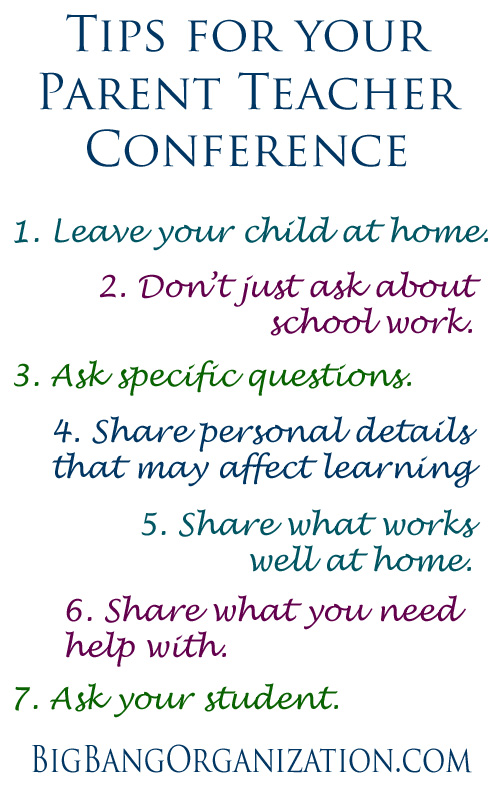Parent-teacher conferences can be great or not. I have sat through my share that weren’t great. Depending on how accepting, we are of someone else’s view of our children. PTC should be a time to exchange information and reaffirm that parents and teachers are on the same page.
We are so busy these days that often parents run in between getting off from work and eating dinner. Give them the time they deserve by preparing. Here are some tips to have a productive PTC:
- Leave your child at home – The teacher is expecting to talk to an adult. If a class behavior has developed or if a learning issue has become apparent having a clear conversation will be difficult if your child is there. The teacher also tends to talk to the student and not the parent.
- Don’t just ask about school work – Ask about social behavior as well, teachers see everything and may have another point of view about a child’s social health.
- Ask specific questions – Teachers only have a few minutes for each student’s parents so cut to the chase if you have a concern.
- Share personal details that may affect learning – an evaluation for learning disabilities, the death of a pet or grandparent or a change in living situations cause stress to students
- Share what works well at home – I spent years educating my daughter’s teachers on how to educate my daughter. If you find something that works at home, share it. My daughter did best when she was given vocabulary at the beginning of the unit. She struggled with learning new words and need ample time. If you use specific words that start positive behavior, share that too.
- Share what you need help with – I don’t have a degree in education and you probably don’t either so if you need help ask for it for the benefit of your child.
- Ask your student – Kids can be shy sometimes about speaking up for their needs. It is important that they learn to self-advocate but they may need you to get the ball rolling. Before going to PTC, ask if there is something your child would like you to talk about with his teacher(s).
If your child’s PTC goes badly. Here are some tips:
- Avoid becoming angry or apologizing – Your child’s behavior isn’t a reflection on your parenting skills. Don’t take personal offense.
- Ask for specific examples of problems and behavior – when, where, how is it being tracked?
- Ask what strategies are being implemented at school and if they are working as well as what you can do at home to help.
- Schedule another time talk if you want to follow-up.
- Decide on the best way to communicate (i.e. phone, email) and stay in touch.
- Take notes – If an issue has developed, you may be getting more information than you cannot process in that small period of time. Taking notes will allow you time to process the information later and to email the teacher with questions.

